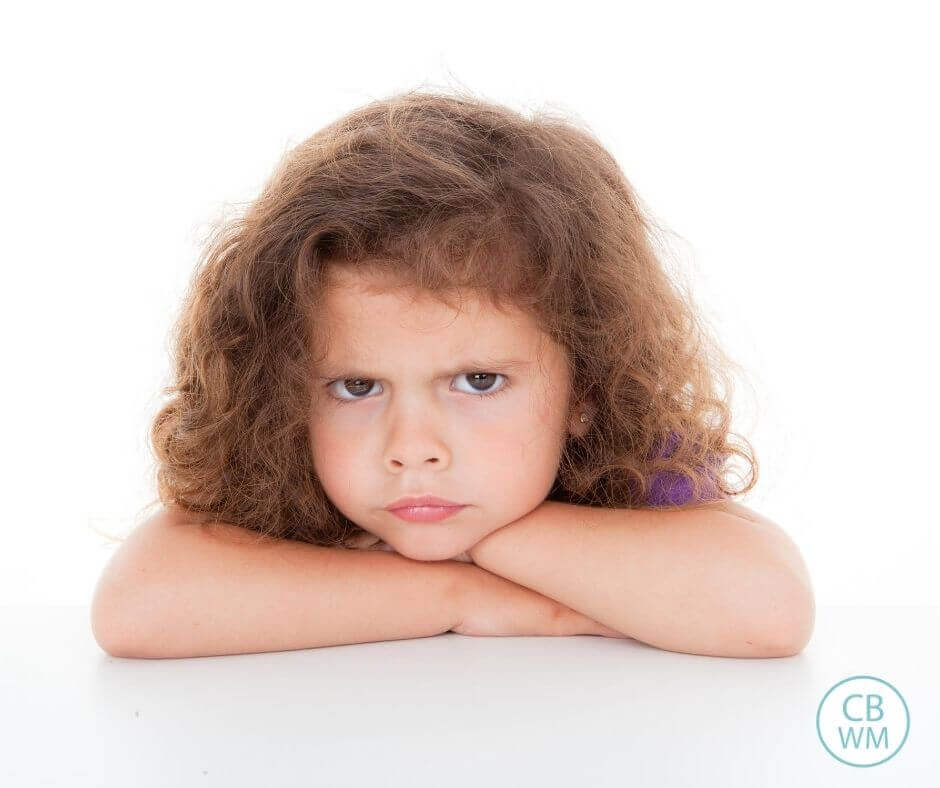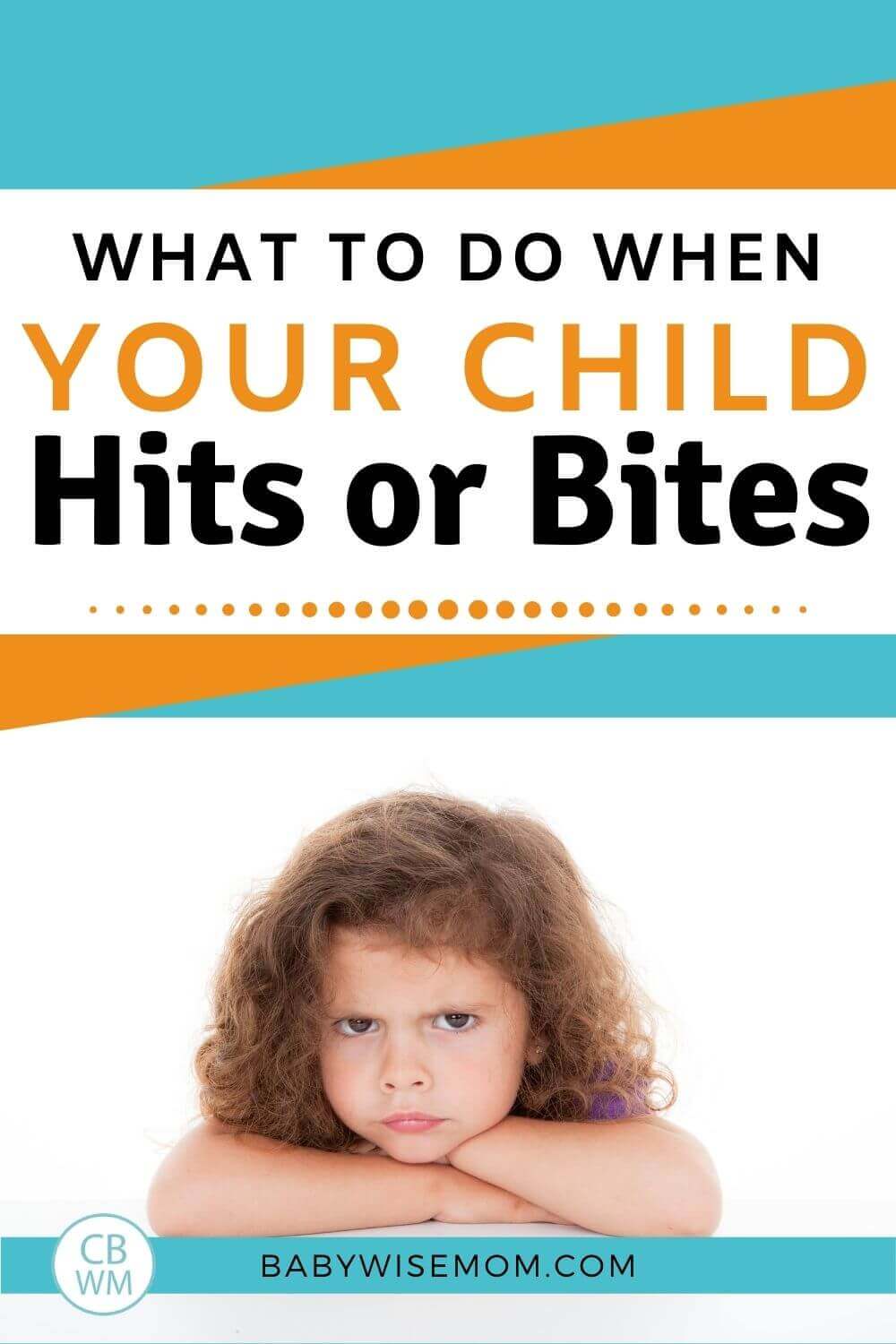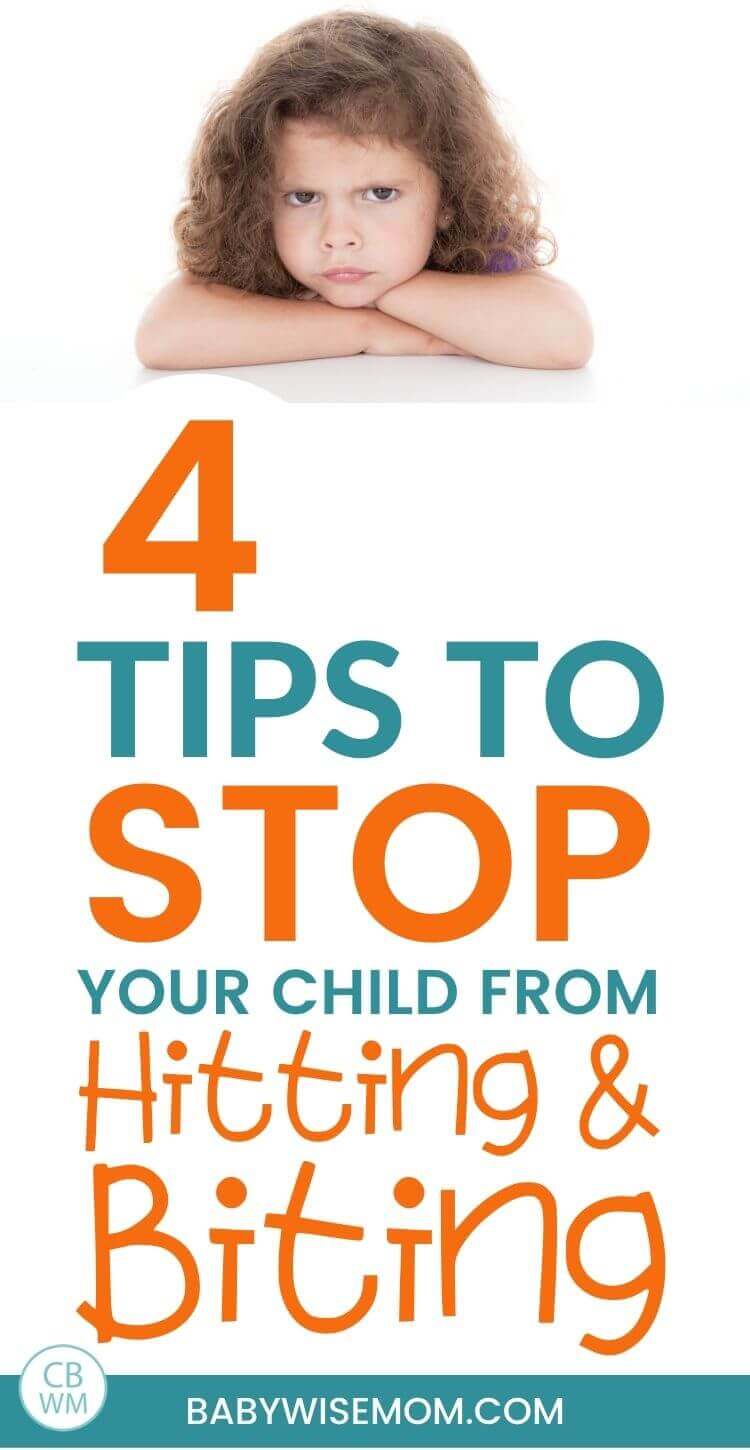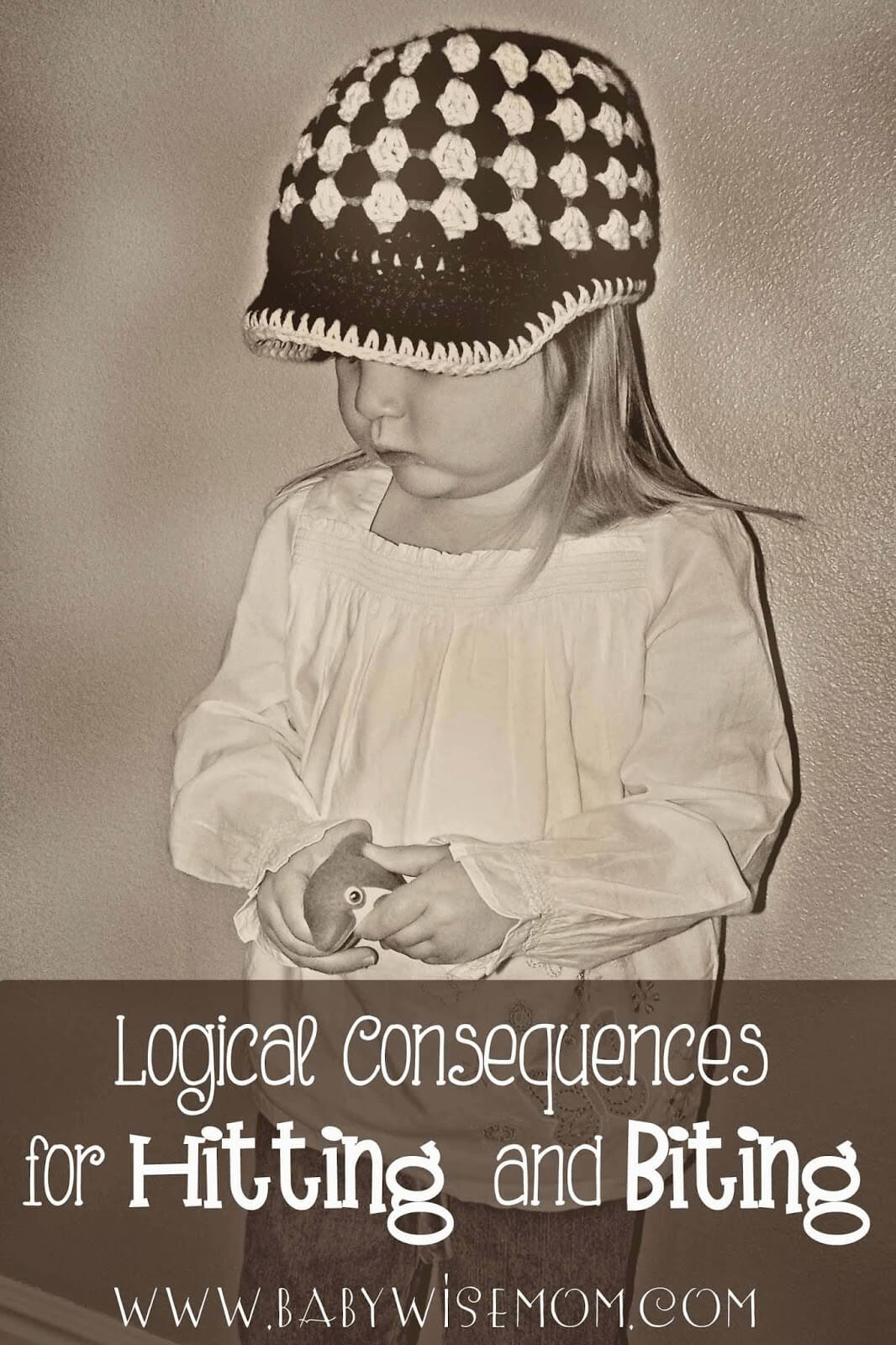What to do when your child hits or bites and how to prevent it in the future. This isn’t something you have to wait for your child to outgrow!

No one wants their child to hit or bite another child. It can be quite embarrassing to have your child hurt another child.
If your child is hitting or biting siblings, it is not embarrassing but it is just as frustrating.
A reader asked:
Hitting and biting, we are still dealing with some of these behaviors on occasion and I can’t figure out why. We never spank, our almost 2 year old son is never around other kids that hit, he just gets mad sometimes or thinks it’s funny and he will hit or bite.
As a parent, this can be a hard situation to handle. For one thing, no one wants to be the parent with the child who hits or bites other children. You feel bad.
There are a couple of areas we need to look to solve this issue.
One is what do we do when this situation occurs. Another is what do we do to prevent this from happening in the future.
Let’s first take the what to do when it happens question.
Post Contents
What To Do When Your Child Hits or Bites
Of my four kiddos, I have had one “hitter.” That was Kaitlyn.
She only (to my knowledge) ever hit Brayden. He was never a completely innocent party.
But, to me, it doesn’t matter how provoked you are to do something; it isn’t okay to hit others–at least in the realm of the world of what my little toddler was experiencing.
I don’t care if your brother can be bossy, you don’t hit.
You might remember that when you are assessing how to apply a logical consequence for an action, you think about what was being abused.
As I think through what is being abused in the situation of hitting or biting, it is another person.
So for Kaitlyn, if she hit Brayden, she was not allowed to play with him anymore.
The length of time she had to stay separate from him varied on her age. It wasn’t ever longer than until after the next sleep period. So if she hit him in the morning, she could play with him after her next nap.
This actually worked quite well.
Brayden and Kaitlyn loved playing with each other, and since Kaitlyn was usually hitting because Brayden was being too bossy and wouldn’t let her have a say, it gave him the motivation to not be so bossy because he wanted to be able to play with her.
It also gave her the motivation to control her temper and not hit him so she could continue to play.
They had to figure out how to play with each other without bossing and without lashing out if they wanted to continue to play with each other.
So for me, no matter the age, hitting and biting leads to immediate isolation.
The length of time for that isolation is dependent upon the age of the child.
When your child hits or bites, swoop in immediately and let your child know the behavior was not acceptable.
This doesn’t mean you have to yell or scream or call him names. None of those actions are good ideas.
Empathy can be quite effective, “That is too bad you hit Jimmy! Now we can’t play with him anymore today. We will have to go now” (or “You will have to sit on the chair next to me while the other children play).”
But when it comes to certain situations, I would be more firm and less empathetic. Like if Brayden hit one of his sisters or Kaitlyn hit McKenna as a baby, I would be more firm.
Again, no yelling, but I would be with that child as fast as I am with eating freshly baked cookies….although I wouldn’t look so pleased.
It would be a no-nonsense sweep that would go something like this, “That is a no. You do not hit a baby. You will now go sit on the couch until ______. That is absolutely not okay.”
And they would know by the look on my face and the tone of my voice that they had just messed up big time.
I must also point out, though, that you need to always be in tune and take each situation case by case.
My blanket thought on how I would react is as I just described, but the one time I was faced with a similar situation, the reaction was quite different.
Whatever you do, don’t lose your temper. Stay calm–but that doesn’t mean you can’t be firm.
>>>Read: How To Handle an Aggressive Toddler
Parents often wonder what to do when their child hits or bites other children and they are out doing something fun.
Maybe you are enjoying talking to the other moms at the park. Maybe your other child is playing quite nicely and you don’t want to punish her just because her sister is being aggressive.
Do not let the hitting or biting slide. Even when you are out having fun.
If you don’t want to leave right away, at least require your child to sit on your lap or sit on the grass next to you. No toys. No friends.
You might also ask a friend to watch your other child while you take the hitter to the car and sit in it for a bit for a time out.
>>>Read: How To Use Time-Out Effectively

How To Prevent Hitting and Biting in the Future
While isolation might serve as a deterrence for hitting and biting, I don’t think it will always solve it forever.
The isolation is telling your child the behavior is not okay, but I don’t think it alone will completely stop the behavior in the future.
So the next step it to try to identify why the child is being aggressive.
Think through the following question:
- Under what circumstances does the child hit or bite? Is it if she doesn’t get her way? Is it if he can’t communicate what he wants to? Is it really only happening when he is tired?
Try to identify the motivation behind the aggression.
I knew for Kaitlyn it was when Brayden was being overbearing in the playing situation.
Once you have identified why, you need to figure out how to remove this why from your child’s life if possible.
If your child only hits when she is tired, make sure you do not have play dates or stay at the park over nap time.
If she gets aggressive when she is hungry, try giving her a snack before playing with others.
Back when sweet Kaitlyn was a hitter, I first talked to Brayden about it and explained why she was hitting him and what he could do about it.
I then talked with Kaitlyn about why it wasn’t okay to hit. I told her that it hurt people and that it didn’t show love.
I told her I knew she was hitting because she was mad, but that didn’t make it okay. I explained that even if we are very mad, we cannot hit other people.
You can never remove every frustration from the child’s life, so you have to teach the child what to do instead of hitting and biting. Give her coping mechanisms.
I think it is also vitally important that you don’t make excuses for your child. Don’t blame the child’s action on another child and don’t apologetically tell a parent, “he is just so tired!” while you do nothing about it.
You can apologize and have him do the same, but don’t be making excuses. That will teach him that his behavior is justifiable and that he is not responsible for it.
Back to teaching the child what to do instead. I instructed Kaitlyn that if Brayden was making her very mad that she should come talk to me about it instead of hitting.
For some people, it won’t be as cut and dry as it was with Kaitlyn. She was hitting in isolated instances and only one person. It was an easy mystery to solve.
It also helps that she has always been an excellent communicator who is quite eloquent for her age, so she could fill me in on her feelings quite well.
Some of you might have a child who hits or bites seemingly randomly and out of the blue. This will be a harder case to crack.
All I can say is to study and pray. Analyze the situation. Maybe even keep a log.
He hit Suzie today completely unprovoked. What was the circumstance? How had meals gone that day? How had sleep gone?
Is he getting too much unsupervised time in the day? How long had he been playing with Suzie? Maybe he can only handle interaction with other children for a certain amount of time before he needs a break.
Take note of the instances and you will likely see some sort of pattern emerge.
In my experience, hitting or biting usually happens more if:
- the child is tired or hungry
- the child is overstimulated in some way (this can include too much playtime)
- the child is trying to communicate and is unable to
- the child is frustrated with another child or person.
So to combat these simply, you would:
- keep the child well-rested and on regular meals
- keep playtimes short and activities appropriate
- help child learn to sign and say simple words (Read: The Screaming Non-Verbal Baby/Toddler)
- try to teach child to control anger while doing what you can to have other children share and play nicely.

Conclusion
This isn’t an easy process. You will not solve this in a day, week, or even month.
It is going to take time and patience on your part. By the time Kaitlyn was 3, Kaitlyn no longer hit.
There were times when she was super frustrated and she would scream a blood-curdling scream, which is preferable to hitting, but still not my ultimate solution to solve conflict. So we still had work to do after the hitting stopped.
Keep working at it and you will get there!
Related Posts on This Blog
- Two Things You Can Do To Avoid Yelling At Your Kids
- 10 Guidelines for Using Logical Consequences
- Logical Consequences for Throwing Toys
- Consequences: Natural VS Logical and How to Use Each
- Making Sure Consequences Actually Work for Kids
Reader Questions
Lisa said…
I was happy to see this post because this is something I’m dealing with right now. The only difference, however, is that my son is hitting adults, not kids (at least not yet). So far, he has hit me and my husband as well as my mom (the dog too). He seems to do it when he is frustrated, but sometimes I don’t have a clue why he hits.
As far as understanding why he hits and trying to eliminate the reason, I don’t know what to do. One example of a time he may hit is when I try to hand him over to daddy. He loves his daddy, but he is on a real mommy kick right now an sometimes will snub daddy. A few times, he has taken it as far as swatting at daddy’s face. How can I stop that? I can’t just let him have his way and not give him to daddy.
Sometimes he hits for seemingly no reason at all. If I’m holding him and I look at his face and make eye contact for too long, he swats.
Here is the scenario: Right after he hits, our innate reaction is to gently grab his hand away from our face. But, he doesn’t always just swat once…he will continually swat and with both hands. So you are trying to protect your face, tell him No and isolate him in the playpen all while he is swatting at your face. In addition, our “reaction” of trying to get him to stop sometimes makes him laugh. He is the kind of baby that loves to get any reaction out of you he can. The more you tell him no, the more he laughs and does things again. That’s bad enough when he is pulling on the curtains, but it’s really awful with the hitting.
So by the time you get him in the playpen, it feels like so much just happened and you aren’t even sure he heard you saying “No we don’t hit” let alone understood what you meant and the “hitting” was the action he had just taken. Once in the playpen, he does cry because he doesn’t want to be isolated, but I really don’t think he realizes that it is because of what he just did. (By the way, he is 16 months old, so the talking to and reasoning with you mention in your post, really won’t work here).
I am basically at the end of my rope. This has been going on for a while. We’ve also tried to teach him “gentle” as well (rubbing his arm or face softly while saying the word.) He just hasn’t gotten it.
I would really love some suggestions. Everything you mention in your post sounds good, but none are really relevant to my exact situation. You were able to tell Kaitlyn that as a result of hitting, she no longer was able to play with Brayden. How can I apply such punishment in our situation?
D&H said…
Lisa, when I worked in a daycare I had a problem with a one-year-old little boy who was hitting another child. You said your boy “is the kind of baby that loves to get any reaction out of you he can.” It was the same for this boy. What worked with for him was to watch him when he was playing and give lots of positive attention when he was doing well so he wouldn’t need to hit to receive attention from me. I would minimize the attention he gets when he hits as much as possible.
thesprain said…
Lisa,
My son sounds exactly like yours and we have dealt with it in a similar manner. I always noticed that it was worse if he was over tired or overstimulated. Avoiding the triggers helps but you can’t always and they need the opportunity to learn. I would say a firm No, grab his arms and gently rub them on my cheeks (or whoever he was hitting as he sometimes hit his baby brother too) and say gentle several times. He sometimes thought was a fun alternative to hitting but if he didn’t comply, he went right to time out. We always used the word time out firmly several times when he was in time out so that he would begin to make that connection and before he got out of time out I would grab his hands and rub them on my face again and say gentle again. I’d also say “are you going to obey?” He’s two now and still has some offenses but he immediately shows me gentle and says “Obey”. It may take time of consistency.
The problem I am having now is what to do with bedtime discipline issues. Jumping up and down instead of laying down to sleep. He only does this for his naps but I can’t put him in timeout before nap, that will only delay naptime!
Babywise Mom said…
Hi Lisa,
A few ideas:
when you give him to Daddy and he hits Daddy, I would take him back and say, “That is a no. You do not hit.” I would then go put him in a playpen to have a time out. Use a timer so if he cries, he sees that the timer, not his crying, gets him out.
Be sure to keep your emotions even. Don’t act hurt, mad, or happy. Just be firm but without emotions.
McKenna is 16 months old, and I am positive she would understand that when she hit and went in isolation, it would be because of the hitting.
I would continue to teach him “gently.” Do it when he isn’t mad. So when you are playing, touch him gently and say, “gently.” When he is happily petting the dog, say “gently” and demonstrate gently.
One point on the dog issue, my vet once told me to never discipline a child in front of the dog because you don’t want the dog thinking it is okay to get mad at the child–you want the dog to respect the child. I haven’t thought much about it, but just thought I would mention it to you. When he hits the dog, I would pick him up and carry him out of the room away from the dog immediately.
LKD said…
We had a similar issue with our pre-toddler, but with biting. Check out the book series, ____ is not for ____. Once we bought the book, Teeth are not for Biting, she has not bitten again (3 weeks ago). Our DD has started grabbing/hitting, so Hands are not for Hitting is on its way!
TeamJBL said…
Lisa-My background is the science of behavior. For what that’s worth…with all of your examples, your son ultimately gets your attention (verbal and/or physical). You need to do 3 things:1. teach him a better way to get your attention and to recognize when he needs it (friend took his toy, wants mom instead of dad, wants you to play with him). Practice at good times–not just after an incident. I love the book suggestion above! Make sure you tell him what you WANT and not just what you don’t want. 2. respond to hitting with low/no attention (if you can’t do NO attention, then limit all verbal or something like that), and respond to positive behavior with LOTS of good quality attention. When he’s with dad–leave the room. When he hits the dog, take the dog into a different room. When you have to intervene–do the pack n play routine you’re doing! 3. When he asks for help, you to play, or otherwise uses words instead of hands–celebrate! hugs, tickles…throw an attention party :)Good luck!!!!
I wanted to add, that with any good plan, your child’s behavior might get momentarily worse before it gets better….He’ll try to ‘up the anty’ in using what he knows works (hitting/tantrum) for a few days/a week before realizing that he’s going to need to use his words or another way to problem solve. The rule of thumb is a month of intervention for every year of a bad behavior….so within a few weeks you should know if something has worked or not!
Amanda said…
We had the same issue with Tobias at just about the same age. First I had to stop taking it personally. It’s not like he was mimicking us hitting, we never spanked or anything and he didn’t watch any TV at that age, just pre-approved videos. It’s a logical thing when you think about it from a 1 year old’s perspective. He’s had every need met up until now, with most of his wants overlapping as needs. Now suddenly he wants things that are more complicated (like mommy’s attention over daddy) and you’ve told him no. It’s like saying “sorry, I know you’ve been supreme ruler of the universe for the past 16 months, but guess what? It turns out you’re not.” lol! Seriously, it is like that to them. I’d hit too if big people were making me do stuff I didn’t feel like doing :)Anyway, what we did was when Tobias hit we’d turn him facing out from us so he stopped and plop him in his crib for isolation. If he can’t be kind, he can’t play with others at that moment. We do the same thing now with the cats, but Tobias is older so if he is not nice to the cats we make him play in his room alone for the rest of the morning, until nap time, or until the next meal, whichever is the next logical break in our day. To me that’s the logical consequence for being unkind, they lose the privilege of being with the family for a bit. For a 16 month old I’d say a 5-10 minute isolation is plenty, with a requirement that they give a kiss or hug when they get off or if they’re verbal an “I’m sorry” is good too, just something to show they’re making amends for causing hurt.
Janelle said…
I noticed that each time your son hit (except for the dog) he was being physically handled. I noticed that once my son became relatively good at walking, he got very defensive when I “manhandled” him. I found that if I led him by the hand to where I wanted him to go he was more compliant. Maybe if you tell him what you are going to do beforehand he won’t feel like all control has been taken away. Like you could say “I’m going to pick you up now and hand you to daddy.” Don’t ask his permission, but at least let him know what you are going to do beforehand.
Carrence said…
We are having issues with our 2.5 year old son. He has been a babywise baby since he was one month old so I don’t think it’s a scheduling issue. He hits me and my husband when he doesn’t get his way. He hits other kids when it comes to sharing. I can deal with the above because I know the why he’s doing it. What I don’t understand is this: over Thanksgiving he would randomly hit the older women in my family, his grandmas and great aunts. They weren’t doing anything but saying hi to him and trying to engage him. Have you ever heard of this and what could be the why behind it?

This post originally appeared on this blog in August 2010
